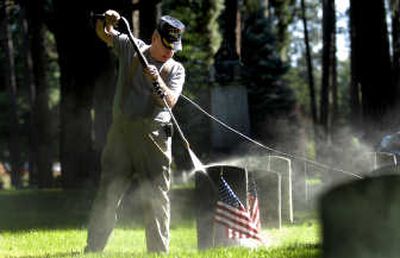Veterans in Idaho clean headstones of ‘brothers-in-arms’

Military personnel call it a “GI party.” That’s the term used when a bunch of GIs thoroughly clean an area.
That area is usually a barracks or office, but recently a group of veterans found an unusual venue for their GI party: Coeur d’Alene’s Forest Cemetery.
“Some of our members belong to several veterans’ organizations,” explained Dusty Rhoads, an Air Force retiree and president of the Coeur d’Alene chapter of the Vietnam Veterans of America.
“When a couple of our guys who are also members of the Veterans of Foreign Wars were planting flags on vets’ graves prior to Memorial Day, they noted that some of the older government-issue gravestones were difficult to read because of the dirt, moss and lichen that accumulated on them over the years.
Rhoads contacted Terry Machado, the lead maintenance worker for the city-owned cemetery, offering to clean veterans’ headstones. Machado happily accepted.
Rhoads experimented with cleanser and brushes, but the incrustations on the 80- to 90-year-old granite were so embedded, they couldn’t be removed without at least an hour’s work on each.
So, he brought his power washer from home, hooked it to a water faucet then fired it up. Within minutes, the stones he sprayed were shiny white, looking like they’d been erected earlier that day.
When he reported his findings to the Vietnam vets’ group, they decided to take on the cleanup project.
Rhoads said few of his organization’s members own power washers, so the Vietnam vets put out the word to buddies. Several responded with washers and hoses.
Those were Navy retiree Fred Ebel, Navy vet and Army retiree Dave Sheridan, Army vets Gene Tanzey and Neil Strom, Air Force vet Bill Sever, and this reporter, an Army veteran and Air Force retiree.
The men took turns at several tasks: planting small flags near each veteran’s grave marker so that the cleaners would know where to head next, dragging hoses and operating four power washers.
“The work went so well we cleaned the 60 or so Civil War vets’ gravestones in about 90 minutes,” Rhoads explained. “We washed the front, top and sides of each stone, but didn’t touch the backs. That way, visitors can see what they looked like before our treatment.”
The wives of many vets are buried next to their husbands, so the workers washed those markers too, Rhoads said.
“Since the work was so rewarding and it was a nice day, we decided to hit the stones of the Spanish-American War veterans, then those of the World War I GIs.
“I don’t have an exact count, but I’d guess we cleaned well over 200 headstones in four hours,” he said.
Rhoads explained that among the 16,000-plus graves in Forest Cemetery, perhaps a thousand or more are veterans. The graves of servicemen and women who served in recent years are marked with bronze headstones or plaques which, so far, are easily read.
“But we may go back and polish up the markers of World War II vets, those that need it, of course.
Research into the backgrounds of the Civil War vets buried in Forest Cemetery revealed that none probably died during their service, but settled in Coeur d’Alene after the war.
Most passed away in the early years of the 20th century. When they were buried, the government supplied the markers which indicate the units to which the men were assigned during the conflict.
Rhoads’ workers didn’t encounter stones marking the graves of Confederate veterans, and he guesses that the emotional wounds of that conflict were still reasonably fresh when those soldiers were buried.
“The U.S. Government probably had a policy against using federal funds to mark the graves of men who were once enemies. But if we learn of any Confederate soldiers’ graves, we’ll clean their stones, too,” he said.
The local Vietnam veterans’ group plans to publicize its efforts through national veterans’ magazines, in the hopes of encouraging similar cleanups elsewhere.
“No matter which wars they fought in, the men beneath those stones are our brothers-in-arms. We’re very honored to be able to look after them,” Rhoads said.